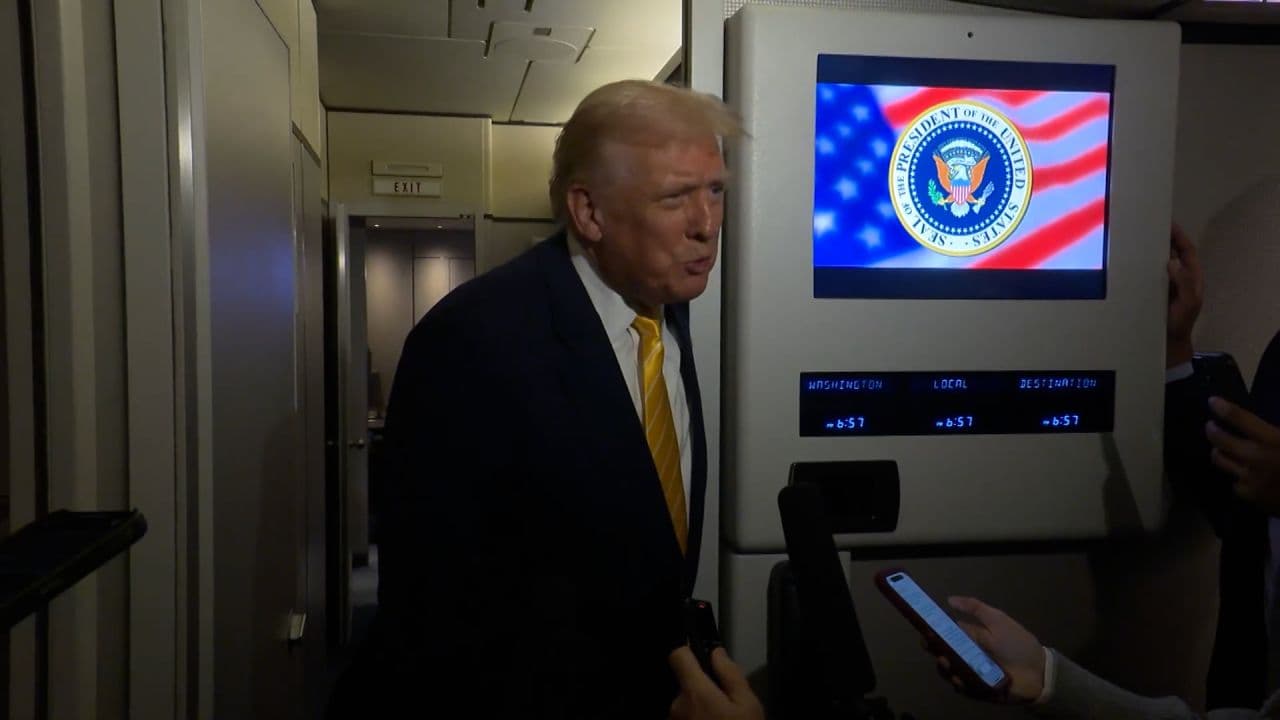We're loading the full news article for you. This includes the article content, images, author information, and related articles.
Former U.S. President Donald Trump's verbal attack on a Bloomberg reporter highlights ongoing tensions with the press, raising global concerns over journalistic freedom and the rhetoric of political leaders.

Former United States President Donald Trump is facing widespread condemnation from media organizations and press freedom advocates after calling a female journalist "quiet, piggy" during a media session. The incident occurred on Friday, November 14, 2025 (EAT), aboard the presidential aircraft, Air Force One, as Mr. Trump traveled from Washington D.C. to Palm Beach, Florida.
The journalist, identified as Catherine Lucey, a White House correspondent for Bloomberg News, was attempting to question the former president about files related to the late convicted sex offender Jeffrey Epstein. Video footage from the press gaggle shows Ms. Lucey asking, "If there's nothing incriminating in the files, sir, why not—" before Mr. Trump interrupted her. Pointing his finger in her direction, he responded, “Quiet. Quiet, piggy.”
The exchange took place amid intensified political and public pressure in the U.S. for the full release of documents connected to Epstein's sex trafficking operations. Prior to the remark, Ms. Lucey and other reporters had questioned Mr. Trump about his past relationship with Epstein and emails where he was mentioned. Mr. Trump denied any wrongdoing, stating he and Epstein "had a very bad relationship for many years."
The comment, which gained significant traction after video clips circulated widely on social media, drew immediate and sharp criticism. Bloomberg News released a statement defending its journalist. “Our White House journalists perform a vital public service, asking questions without fear or favor,” the statement read. “We remain focused on reporting issues of public interest fairly and accurately.”
Prominent journalists and media figures described the remark as "disgusting and completely unacceptable" and "degrading." The incident has renewed focus on Mr. Trump's history of using personal and often derogatory language against journalists, particularly women. This pattern includes past instances of calling female reporters “nasty” or “losers” and using the insult “Miss Piggy” in reference to a former Miss Universe winner, Alicia Machado, in 1996.
In response to the backlash, a White House official, speaking anonymously, defended the former president's remark. The official alleged that Ms. Lucey “behaved in an inappropriate and unprofessional way towards her colleagues on the plane,” though no evidence was provided to support this claim.
While the event has no direct link to Kenyan politics, it resonates with broader international concerns about the safety of journalists and the erosion of civil political discourse. For audiences in Kenya and East Africa, where press freedom is a continuous struggle, the conduct of a major world leader toward the media serves as a significant global benchmark. Such high-profile incidents can embolden political figures in other nations to adopt similar tactics of intimidating or discrediting journalists who ask critical questions.
The episode occurred just days before the U.S. House of Representatives voted overwhelmingly to pass the Epstein Files Transparency Act, which calls for the Justice Department to release the unclassified documents. Mr. Trump, who had previously opposed the release, has since indicated he would sign the bill into law. The timing of the verbal attack has fueled further questions about his stance on the files' disclosure.
This incident underscores the challenging environment journalists face globally when covering powerful political figures. It highlights the tension between the media's role in holding leaders accountable and the increasingly hostile rhetoric employed to deflect scrutiny. The international focus remains on how such actions impact democratic norms and the public's right to information, a principle of universal importance.
Keep the conversation in one place—threads here stay linked to the story and in the forums.
Sign in to start a discussion
Start a conversation about this story and keep it linked here.
Other hot threads
E-sports and Gaming Community in Kenya
Active 9 months ago
The Role of Technology in Modern Agriculture (AgriTech)
Active 9 months ago
Popular Recreational Activities Across Counties
Active 9 months ago
Investing in Youth Sports Development Programs
Active 9 months ago